namdhari world
Main menu:
- Home Page
- Kuka Faith
- History
- Sikh Gurus
- Namdhari Gurus
- Freedom Fighter - Satguru Ram Singh Ji
- Warrior of Peace
- Non-Cooperation Movement page 1
- Non-Cooperation Movment page 2
- Kuka Postal Service
- No Trial
- Battle for recognition as part of India's struggle for freedom
- Plaque at Ludhiana Railway Station
- Ram Singh Kuka by G.K.Venkateshamurthy
- Social Reforms by Satguru Ram Singh Ji
- Birth of Sant Khalsa
- Kuka Movement - by Film division of Government of India
- KUKA LEHAR - India's first war for independance (1856)
- Satguru Jagjit Singh Ji
- Contradictions
- Historical Quotes
- Vaisakhi - 1699
- Gurmukhi Script
- Sikh Women
- Knowlegde Bank
- Connections
- Places to visit
- Resources
- Music World
- Calendar
- Sports
- ETC...
Non-Cooperation Movment page 2
History > Freedom Fighter - Satguru Ram Singh Ji
DO NOT COOPERATE WITH THE CORRUPT RULERS
IT was the founder of the Kooka movement and the Namdhari Sikh sect, Satguru Ram Singh, who evolved the concepts of swadeshi and non-cooperation which were to form the comer-stone of Mahatma Gandhi's successful nationwide satyagraha movement that spelt finally the end of the British rule in India.
According to the first President of India, Dr. Rajendra Prasad, the organisation of the Kookas became very strong within years of its birth at Bhaini Sahib in 1857. The Guru had given his followers a five-pronged call for the boycott of government services, the boycott of educational institutions opened by the British, the boycott of law courts started by the British, the boycott of foreign made goods, and to boycott, resist and refuse to obey the laws and orders which offended their conscience. Thus, long before the Congress movement, of Mahatma Gandhi, it was the Namdhari Satguru who gave the nation the concept and technique of boycott, non-cooperation and swadeshi as the three main planks of the ethos of the successful freedom stmggle of India. In a way Gandhi and Nehru could be considered the political and spiritual inheritors of the first great warrior in white, Satguru Ram Singh Ji.
The Kooka message was essentially a call to the nation exhorting Indians not to cooperate with the corrupt and unjust foreign rulers. And as the numerical and spiritual strength of the Kookas began to grow in the Punjab, they became the romantic heroes of the freedom struggle with a very special way of life and thought. Their message and a approach were simple and in the language and idiom of the ordinary people. Their exhortations, spiritually drew all their inspiration from the teachings of the saint and soldier Gurus of the Sikhs, mainly from the teachings of the founder of the Khalsa, the true ones, the soldier-saint Guru Gobind Singh. So, to struggle for freedom became a religious, spiritual and ethical duty for the Kookas and their white dress, a mark of distinction to single them out as men and women of mission, clean, committed and conscious of their do-or-die duty to the land of their birth. They were always to remember that their cult was born in the Baisakhi season, the popular Punjabi peasantry's festival of birth with joy and death with glory. On this day, while the Punjabi peasant rejoiced in the fruits of his labour and sweat after the harvesting of plentiful crops, he also honoured and remembered the great martyrs who fell in the cause of freedom and humanity.
Another distinctive feature of the Kooka organisation and cult was in direct contrast to the policy of the then British rulers in India. The British believed in pursuing the policy of divide and rule, the Kookas gave the call to Unite and Fight.
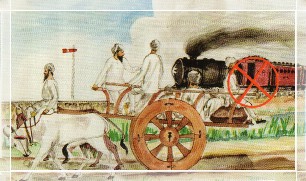
Boycott British transport
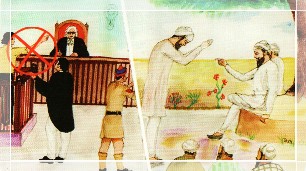
Boycott British courts
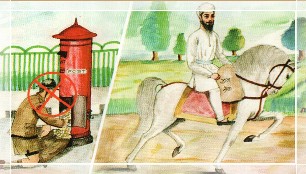
Boycott British courts
For the first few years after its birth, the Kooka organisation managed to evade the eye of the British through systematic and quiet nonand non-usage of the essential services and facilities introduced and controlled in India by the British.
The Kookas did not travel by trains. For them it was sin to ride a "Rail Gaddi" or the cart on the steel tracks, because it was a vehicle of the alien colonial masters. The Kookas travelled by horse, bullock cart or by' foot but not by railway train. That way they also managed to evade the eye of the British spies and policemen.
The Kookas were also strictly forbidden to make use of the British introduced postal services in India. They organised their own system of communication. They invented and perfected their own system of sending and receiving messages, letters and orders, from and to their national and international headquarters in Bhaini Sahib.
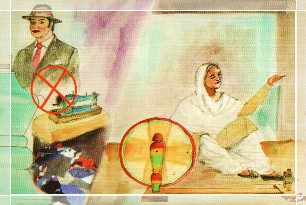
Boycott British cloth
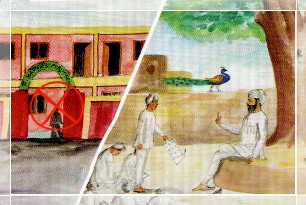
Boycott British schools
The language of communication of the Kookas was mostly a Punjabi version which specially evolved itself during usage into a kind of a code language which was difficult even for the bulk of Punjabis outside the Kooka organisation to easily understand. They also used the then prevalent court languages of India like Persian, but as a principle stayed away from the use of the foreign, or firangee, English language.
Their masters, like the present Satguru Jagjit Singh Ji Maharaj had to launch a special drive for the re-education of the children of the Namdharis to face the modem competitive life where the use of foreign languages like English has become essential in the changed world of ours.
Strange as it might seem, the Kookas of those early days would not even use the 'sarkari sarak' or the road built by the British Government. Following the rural foot-walks and goat-tracks in the hills, they went miles and miles not only in India but also in countries.
The underground organisation of the Kookas, with its own secret codes and national and international contacts with other groups of freedom fighters, was perfected in the sixties of the 19th century. Soon they had a very wellorganisation and secret cells functioning at even far flung places like Peshawar, Kabul, Haripur Hazara and the Roosi Turkistan, the Turk areas of Russia.
The word Suba in ordinary Punjabi means a province or a state of the country. But in the Namdhari language it meant a special commander or governor for a special region or for a special mission, appointed by the Namdhari Durbar or the spiritual court of the sect under the direct instruction and inspiration of the temporal and spiritual master, the Satguru, or the true master. Therefore, Suba Gurcharan Singh, the Chief of the underground services of the Kookas was also a special international envoy of Satguru Ram Singh.
The Kooka secret service and underground forces were carefully organised and developed after taking into account the historical factors which had led to the disintegration of the Great Sikh Dream and the much feared and respected empire of Maharaja Ranjit Singh, which was in its own special way, at one time looked upon as the flowering of the ethos of Sikhism and Punjabi and Indian nationalism. Therefore while it drew all inspiration from the teaching; of the Great Gurus, it also took a crucial and analytical view of the causes and circumstances of the fall and degeneration of men and women in power at the juncture of time, who claimed to be Sikhs and Khalsas-the pure ones-but had strayed from the path of the great gurus.
The Kookas at the time obviously considered themselves as the true inheritors of the divine mission of Guru Gobind Singh who had declared: "To be a Khalsa is to be a lion, is to tolerate no oppression, is to be a lifelong warrior in the propagation of virtue".
Both Guru Gobind Singh and Sat guru Ram Singh, had challenged in their own way and under the challenging environment of their own times, the might of the Mughal and the British imperial powers respectively. Both had embarked on the mission of freedom and justice, purity and sacrifice, equating political freedom and spiritual purity as essential rights and duties of free and pure men and women. Netaji Subhash Chandra Bose, was also inspired by the teachings of Satguru Ram Singh when he made his famous call to Indian freedom fighters of Azad Hind Pauj.
The blood, which the Kookas sacrificed for the freedom of their motherland and in relieving the suffering of humanity, is a glorious debt which a nation can never repay except by following their path and message to keep man free from all political and social bondage, at any cost. That is, if the rulers are corrupt and unjust a true Kooka must fight them, through nonand disobedience, and if necessary, by taking up an open confrontation with the immoral and the unjust. Looking from that perspective, one can see the Kooka movement as one of the first strongly and well-knit movements to fight for human rights also. Satguru Ram Singh was obiously impelled by his own pain and suffering when he saw the citizens of his beloved country denied the most basic human rights, by an alien colonial power in the their very homeland.